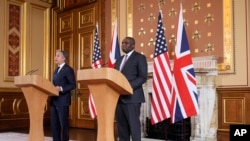London —
Washington is imposing new sanctions on Iran over its supply of missiles to Russia for use in Moscow’s illegal invasion of Ukraine, U.S. Secretary of State Antony Blinken announced Tuesday.
The U.S. State Department said the sanctions aimed to further constrain “Iran’s destabilizing activities” and target individuals and businesses based in Iran and Russia, including Iran’s flagship airline, Iran Air, which the U.S. said was involved in the weapons transfer.
Pentagon press secretary Major General Pat Ryder confirmed that Iran had transferred shipments of Fath-360 close-range ballistic missiles to Russia, and that they could be employed against Ukraine “within weeks.” Prior to the transfer, Russian military personnel were trained in Iran to use this system, he said.
Ryder called Iran’s transfer of the short-range missiles, which can hit targets up to 120 kilometers away, a “concerning development” that deepens Russia’s military arsenal.
“One has to assume that if Iran is providing Russia with these types of missiles, that it’s very likely it would not be a one-time deal [and] that this would be a source of capability that Russia would seek to tap in the future,” he added.
Speaking in London, Blinken said the growing cooperation between Russia and Iran “threatens European security and demonstrates how Iran’s destabilizing influence reaches far beyond the Middle East.”
“For its part, Russia is sharing technology that Iran seeks,” Blinken told reporters. “This is a two-way street, including on nuclear issues, as well as some space information.”
Blinken added that Russian President Vladimir Putin was now relying increasingly on help from Iran and North Korea to get weapons, a clear violation of multiple U.N. Security Council resolutions, and was also getting aid from China.
“One of the reasons that Putin is able to continue this aggression is because of the provision of support from the People’s Republic of China, the biggest supplier of machine tools, the biggest supplier of microelectronics, all of which are helping Russia sustain its defense industrial base.”
Without specifically identifying ballistic missiles, Moscow confirmed Monday that Russia and Iran are cooperating in the “most sensitive” areas.
“Iran is our important partner,” Kremlin spokesperson Dmitry Peskov told reporters in a phone call. “We are developing our cooperation and dialogue in all possible areas, including the most sensitive ones.”
When Blinken and British Foreign Secretary David Lammy visit Kyiv this week, Ukrainian President Volodymyr Zelenskyy will likely push for the Western allies to allow Kyiv to use their long-range missiles on targets inside Russia, said analyst Garret Martin, co-director of the Transatlantic Policy Center at American University in Washington.
“Generally, the U.K. has been often more at the forefront, maybe more at the vanguard, of being more supportive of Ukraine,” he told VOA. “So, it’s a question here — especially if you’re thinking about the debates over long-range strikes — are they able now to come up on a sort of similar position?”
Speaking to Sky News on Tuesday ahead of the visit to Kyiv, Blinken said that U.S. President Joe Biden is “not ruling out” allowing Ukraine to use U.S.-supplied missiles to strike targets inside Russia.
Ukraine has had “what it needed, when it needed it, to be effective in repelling the Russian aggression,” Blinken said.
British Prime Minister Keir Starmer is due to visit Biden in Washington Friday, with Ukraine and the Middle East at the top of the agenda.
“Particularly for Ukraine and for the Middle East, the next few weeks and months are critically important,” Starmer told the BBC on Sunday. “And therefore, it’s important for me to speak to President Biden about our shared response, the response of our allies to the pressing, immediate issues, but also to the more strategic long-term issues.”
Last week, Britain announced the suspension of some arms sales to Israel over concerns its attacks on Hamas targets in Gaza breach humanitarian law, which Israel denies. The U.S. is continuing to supply weapons and says it does not believe Israel is breaking international law.
Pentagon correspondent Carla Babb contributed to this report.
Source: voanews.com




